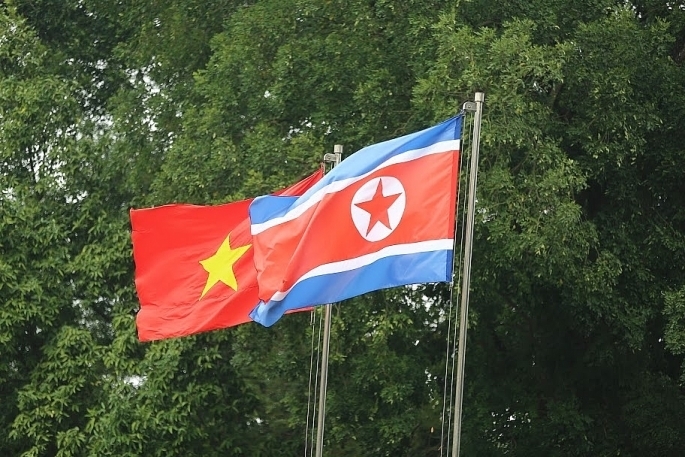Vietnam and the DPRK established diplomatic relations on January 31, 1950. In January 1955, Vietnam decided to open its embassy in Pyongyang, and in April the same year, the DPRK opened its embassy in Hanoi. Over the past 75 years, the traditional fruitful friendship between the two nations, founded by President Ho Chi Minh and President Kim Il Sung and nurtured by generations of leaders of the two Parties and States, has been treasured, preserved, and continuously strengthened.
    |
 |
|
The national flags of Vietnam and the DPRK (Photo for illustration: phapluatxahoi.kinhtedothi.vn) |
This enduring relationship has been reinforced through numerous high-level visits since the establishment of Vietnam - DPRK diplomatic ties, with highlights including President Ho Chi Minh’s official friendship visit to the DPRK in 1957; Premier Kim Il Sung’s friendship visit to Vietnam in 1958; Prime Minister Pham Van Dong’s visit to the DPRK in 1961; President Kim Il Sung’s unofficial visit to Vietnam in 1964; President Tran Duc Luong’s visit to the DPRK in 2002; General Secretary Nong Duc Manh’s official friendship visit to the DPRK in 2007; and General Secretary of the WPK and President of the State Affairs of the DPRK Kim Jong Un’s official friendship visit to Vietnam in 2019.
Since the 1980s, the two countries have maintained the Vietnam - DPRK Intergovernmental Committee on Economic and Scientific-Technical Cooperation, working to develop the bilateral ties intensively and substantively through various important cooperation agreements, including the Cultural Cooperation Agreement (1957), the Scientific and Technical Cooperation Agreement (1958), the Treaty of Friendship and Cooperation (1961), the Trade and Maritime Agreement (1962), the Medical Cooperation Agreement (1966), the Visa Exemption Agreement for Diplomatic and Official Passports (1969), the Civil Aviation Transport Cooperation Agreement (1997), the Maritime Transport Agreement (2002), the Trade Agreement (2002), the Judicial Assistance Agreement (2002), the Investment Promotion and Protection Agreement (2002), and the Double Taxation Avoidance Agreement (2002).
The time-tested friendship between the two countries is also reflected in cooperation across other fields. From the 1960s to 1970s, the DPRK helped train hundreds of Vietnamese students. Today, the DPRK Education Commission and Vietnam’s Ministry of Education and Training are promoting an agreement on educational cooperation. Additionally, Vietnam has sent numerous art troupes to pay friendship visits to and perform in the DPRK.
General Secretary To Lam’s state visit to the DPRK and attendance at the 80th anniversary celebration of the Workers’ Party of Korea mark an important milestone in the history of traditional friendship between the two nations. It is also a highlight in the context of that Vietnam and the DPRK are organizing the Friendship Year 2025 and celebrating the 75th anniversary of the establishment of diplomatic relations.
The visit reaffirms Vietnam’s consistent foreign policy of independence, self-reliance, peace, cooperation, and development, multilateralization and diversification of external relations. Vietnam remains a friend, reliable partner, and responsible member of the international community. The Party, State, and people of Vietnam attach great importance to and are willing to strengthen and further develop the traditional friendship with the Party, State and people of the DPRK, in line with the interests of both peoples and each country’s international commitments, contributing to regional and global peace, stability, cooperation, and development.
The peoples of both nations firmly believe that General Secretary To Lam’s visit will be a great success, marking a new historic chapter in the Vietnam - DPRK traditional flourishing friendship. The visit also offers both sides the opportunity to update each other of national developments, share insights and discuss measures to deepen friendship, trust and mutual understanding, and cooperation between the two Parties and States.
By Editorial Board of the People’s Army Newspaper
Translated by Mai Huong